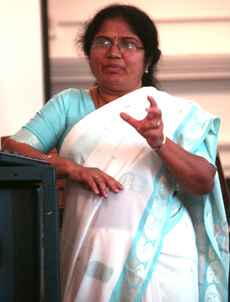Linguistic Dept. brings South Asian Language Fair

Shyamala Chengappa lectures about her research on “Aphasia In Multilinguals” as part of the South Asian Linguistic Analysis conference Sunday morning at the University of Illinois Student Union. Tessa Pelias
Sep 19, 2005
Last updated on May 11, 2016 at 10:11 p.m.
By Kiran Sood
Staff writer
The University Linguistics Department held its 25th annual South Asian Language Analysis Conference from Sept. 15 to 18 at the Illini Union. The Department is one of the oldest and most distinguished departments of linguistics in the United States, attracting graduate students from all over the world.
The department has done much work on the structure and functions of South Asian languages.
Get The Daily Illini in your inbox!
This year, the University hosted a symposium on language teaching that preceded the conference’s roundtable discussion.
The conference featured two main sessions, entitled “South Asian Perspectives on Applied Language Science” and “Language in Globalization: Perspectives from South Asian Languages.” According to the fair’s Web site, the study of South Asian languages has, since the first conference at Illinois, enhanced and transformed linguistic research methods, theoretical practices and application of multilingual realities to the forms and functions of languages across cultures.
Rakesh Bhatt, University professor of linguistics and correspondence coordinator for the conference, outlined exactly what was planned for the conference. He said there would be many different activities taking place at the conference’s roundtable discussion.
Bhatt said that throughout the weekend, there were many speakers who lectured on topics ranging from ideology, religion and language choice in South Asia to historical linguistics and identity.
He said that many of the speakers have traveled from distant locations to take part in the conference.
“We have Tara Mohanan and K. P. Mohanan, who are from the National University of Singapore,” Bhatt said. “They will be speaking in a lecture entitled Universal Grammar, Constructions, and South Asian Languages.”
Tara Mohanan said their presentation would examine questions about the Malayan and Hindi languages.
“Although the properties of well-known constructions like the passive, causative, complex predicates, and cleft have been extensively investigated in theoretical linguistics in terms of universal laws (rules, constraints, principles),” Mohanan said.
Swati Acharya, sophomore in Engineering, is currently in an Asian mythology class and is studying the importance of languages. Historically, we can definitely see South Asia has some of the oldest cultures in our world, Acharya said.
“It teaches us about where we come from, and our culture, and evolution of the advancements in technology/language,” Acharya said. “From a philosophical and psychological point of view, it shows us what people used to be like.”
Acharya said that the Asian language of Sanskrit is tied to European languages, showing a common root. She said we should not forget our own individual languages and where we have come from. Acharya said her own native language of Oriya is slowly losing popularity, and that thought scared her.
Chirag Amin, senior in Business, said that communicating well is an important skill and part of our everyday lives.
“I’ve always strongly believed in that it’s not what you necessarily say, it’s how you say it,” Amin said. “The actual words are only so important. Two people could say the exact same words and be taken in two completely different ways based on tone, location, style.”





